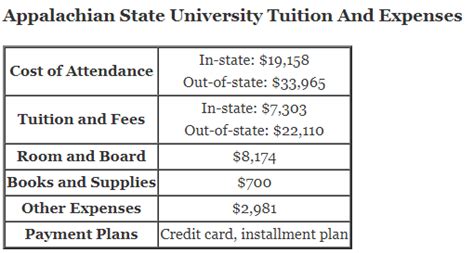Set amidst the stunning Blue Ridge Mountains, Appalachian State University (ASU) offers a top-notch education at a value-driven cost. With tuition rates competitive for both in-state and out-of-state students, ASU strives to make higher learning accessible.

Tuition Rates for the 2023-2024 Academic Year
| Category | In-State Undergraduate | Out-of-State Undergraduate |
|---|---|---|
| Tuition and Fees | $6,848 | $21,024 |
| Student Services Fee | $548 | $548 |
| University Recreation Fee | $210 | $210 |
| Mountain Lion Network Surcharge | $540 | $540 |
Additional Fees:
- Application fee: $50
- Parking permit (optional): $86-$360
- Health insurance (optional): $1,260-$2,984
Residency Requirements for In-State Tuition
To qualify for in-state tuition, students must meet the following requirements:
- Be a legal resident of North Carolina for at least 12 months prior to the start of the semester.
- Establish and maintain a permanent residence in North Carolina.
- Provide proof of residency, such as a driver’s license, voter registration, or lease agreement.
Financial Aid and Scholarships
ASU offers a wide range of financial aid options to assist students with the cost of tuition. These include:
- Federal Pell Grants: Up to $6,895 per year for eligible students from low-income families.
- Federal Supplemental Educational Opportunity Grants (SEOG): Up to $4,000 per year for eligible students with exceptional financial need.
- Work-Study Program: Allows students to earn money on campus to help cover expenses.
- Scholarships: ASU offers over 700 scholarships based on academic merit, financial need, or other criteria.
Tips and Tricks for Saving on Tuition
- Apply for financial aid early. The FAFSA application opens on October 1st each year, and awards are processed on a first-come, first-served basis.
- Explore scholarship opportunities. Conduct thorough research to identify scholarships that fit your qualifications.
- Consider part-time enrollment. Taking fewer courses per semester can reduce your tuition bill.
- Take advantage of transfer credits. Transferring credits from other institutions can save you time and money.
- Negotiate with the financial aid office. In some cases, you may be able to appeal for additional financial assistance if you have extenuating circumstances.
Common Mistakes to Avoid
- Not applying for financial aid. Many students fail to apply for financial aid, which can result in missing out on thousands of dollars in potential savings.
- Not meeting residency requirements. Ensure you meet the residency requirements for in-state tuition to avoid paying out-of-state rates.
- Overpaying for textbooks. Explore used book options, rent textbooks, or purchase digital versions to save on textbook costs.
- Not budgeting. Develop a realistic budget that includes all expenses, including tuition, fees, housing, and food.
- Ignoring deadlines. Financial aid deadlines are firm. Missing deadlines can result in reduced or delayed funding.
Frequently Asked Questions (FAQs)
Q: What is the average cost of attendance at ASU?
A: For in-state undergraduate students, the average cost of attendance (including tuition, fees, housing, and food) is estimated at $21,258 per year.
Q: Can I apply for financial aid if I am an international student?
A: International students are not eligible for federal financial aid. However, ASU offers a limited number of scholarships specifically for international students.
Q: What is the deadline for submitting the FAFSA?
A: The FAFSA deadline is June 30th for the following academic year. However, it is recommended to apply early as funds are limited.
Q: Can I appeal for financial assistance if I have extenuating circumstances?
A: Yes, you can submit an appeal to the financial aid office with documentation supporting your request.
Q: What is the Mountain Lion Network Surcharge?
A: The Mountain Lion Network Surcharge is a technology fee that provides students with access to essential resources, such as Wi-Fi, computer labs, and academic software.
Q: How do I establish residency for in-state tuition?
A: You must prove that you have lived in North Carolina for 12 months prior to the start of the semester and have established a permanent residence in the state.
